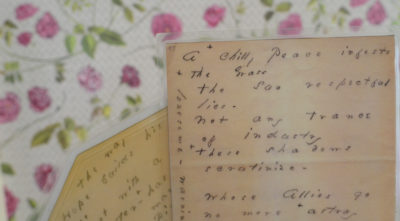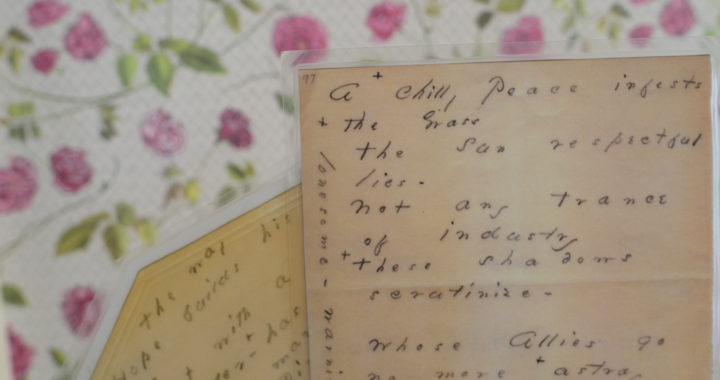 SOLD OUT
SOLD OUT
Join us for a lively virtual discussion of Emily Dickinson’s poetry and letters, meeting once a month from February to May. This program is designed to welcome newcomers and seasoned readers of Dickinson alike.
Each session is facilitated by a guest scholar with unique expertise, who leads the group in discussion following an introductory talk. Brief reading handouts will be distributed prior to each month’s program.
Topics and Leaders:
- February: “Oh Sumptuous moment / Slower go”: Dickinson, Desire, and Temporal Dislocation with Emily Coccia
- March: Emily Dickinson’s “Tempest” with Melba Jensen
- April: “Emily Dickinson and the Invention of Faith” with Emily Seelbinder
- May: Dickinson and Disability Poetics with Clare Mullaney
Format
As a registrant, you are signing up to join a small group of 25 or fewer regular participants for four 90-minute zoom sessions. Meetings are participatory, with video and audio encouraged. Because we want everyone to feel comfortable speaking, full sessions will not be recorded. The program is designed for adult audiences (18+).
Registration
We are offering an identical program for Wednesday and Friday groups. Please review the dates carefully — space is limited.
Refunds are not available for this program.
Wednesday Group (SOLD OUT), $100 program fee (inclusive of all sessions), limited to 25 participants
February 21, 6-7:30pm ET
March 20, 6-7:30pm ET
April 24, 6-7:30pm ET
May 22 6-7:30pm ET
Friday Group (SOLD OUT), $100 program fee (inclusive of all sessions), limited to 25 participants
February 23, 12-1:30pm ET
March 22, 12-1:30pm ET
April 26, 12-1:30pm ET
May 24, 12-1:30pm ET
Optional Meet & Greet for both groups: Wednesday, February 7 from 6-6:45pm
For Educators:
Educators may request a certificate attesting to your participation in the program. Those interested may attend an additional session on May 29 from 6 to 7 to discuss curricular connections and ideas with fellow educators.
Reservations are made on a first-come, first-served basis.
Questions: Don’t hesitate to reach out at edmprograms@emilydickinsonmuseum.org with any questions about the program.
FEBRUARY
“Oh Sumptuous moment / Slower go”: Dickinson, Desire, and Temporal Dislocation
In the third season of Apple TV+’s Dickinson (2019-21), the poet finds herself transported out of her nineteenth-century context and into the 1950s, where a young Sylvia Plath provides Emily Dickinson with the words and inspiration to come out to her sister Lavinia. Although the time travel plotline is obviously fictional, there persists an image of Dickinson as a figure out of time—or out least out of temporal lockstep with her nineteenth-century moment. This discussion will consider both the ways Dickinson has been represented in relationship to her historical context and how she herself wrote about temporality. From seconds and moments to eternity and
infinity, Dickinson’s poems and letters abound with mentions of time and duration. Together, we will explore the different ways time is felt and experienced in individual works, paying particular attention to how Dickinson uses words to create “world enough and time” for her own queer desires.
Emily Coccia is a Ph.D. candidate in the joint program in English and Women’s and Gender Studies at the University of Michigan. Focusing on nineteenth-century genres of working-class and mass-popular literature, her research asks how American workingwomen’s creative reception practices allowed them to envision queer futures and to cultivate spaces for pleasure and intimacy. Her writing has appeared in journals including Legacy: A Journal of American Women Writers, Transformative Works and Cultures, and the Emily Dickinson Journal.
MARCH
Emily Dickinson’s “Tempest”
In William Shakespeare’s play The Tempest, the deposed Duke Prospero chooses between practicing his alchemical arts in exile and returning to govern Milan. In exile, he uses poetry, music, and language to control his dependents–enchanting his daughter Miranda with a pageant of divine love while thwarting his servants’, Ariel and Caliban, desire for freedom. In this discussion, we’ll trace how Dickinson alludes to these characters and their experience of poetry in four poems about the power of poetry. Participants do not need to read The Tempest to appreciate these poems or enjoy the discussion, but we will share resources for accessing the play and discussing the plot.
Melba Jensen has taught English, computer literacy, and mathematics to college students and high school students since 1986. She completed her Ph.D. in English with an emphasis in nineteenth-century American Literature at the University of Massachusetts in 2005. She has been a lecturer in American Literature at the University of Massachusetts and is a guide at the Emily Dickinson Museum.
APRIL
Emily Dickinson and the Invention of Faith
Though Emily Dickinson may not fit traditional molds for religious persons, in her own time or in ours, she was clearly fascinated by spiritual matters, and she explored such matters from differing, often contradictory points of view. Many readers/scholars have attempted to codify Dickinson’s religious perspective. Much has been made of her assertion to T. W. Higginson that her family was “religious” but she herself was not (L261), of her apparent practice of keeping the Sabbath by “staying at Home” (J324/Fr236/M 115), of her correspondence with several clergymen and her obvious interest in good preaching, and of her many statements expressing both belief and unbelief in poems, letters, and biographical anecdote. She has been claimed as both Catholic and Protestant, Calvinist and anti-Calvinist, firm believer and lifelong skeptic. She has also been identified as a mystic, an antinomian, and an existentialist. There is evidence in Dickinson’s life and work both to confirm and to disprove these claims. Adding to the difficulty for readers is Dickinson’s fondness for ambiguity and paradox, as well as her use of voices that contradict each other when poems on similar subjects are compared side by side. As we discuss
some of these poems, we will not attempt to pin Dickinson down. Instead, we will find a rich and diverse consideration of faith, scripture, theology, prayer, and other spiritual practices that likely will raise more questions than answers and spur us to explore these matters further in our reading of Dickinson and other poets.
Emily Seelbinder served as a Professor of English at Queens University of Charlotte from 1989 until her retirement as a Professor Emerita in 2019. Though she cultivated a reputation there as “the Meanest, Baddest English Teacher on the Planet,” she received the Fuqua Distinguished Educator Award twice and, in 2007, the Hunter-Hamilton Love of Teaching Award. At Queens she developed courses on African American literature and culture and on the U. S. Civil War and American Literature, as well as an interdisciplinary course entitled “Emily Dickinson and Her Descendants.” A self-proclaimed “Dickinson Evangelist” and longtime member of the Emily Dickinson International Society (EDIS) and of the Emily Dickinson Museum, she has frequently led workshops and discussions for high school students, book clubs, public library gatherings, church groups, senior citizens, and the Road Scholars programs of the North Carolina Humanities Council. In 2011 and 2014, she was a member of the faculty for the Museum’s NEH Landmarks of American History and Culture Summer Seminars for K-12 teachers. Her scholarly work has long focused on Dickinson’s use—and abuse—of scripture and on how contemporary composers “read” Dickinson through music. Her publications include a chapter on Dickinson’s Bible in Dickinson in Context (2003), essays in the EDIS Bulletin about musical settings of Dickinson’s work, and, in the Emily Dickinson Journal, an essay on “Teaching Emily Dickinson in the Trenches” (1999) and a review of Divide Light Opera Film (2022).
MAY
Dickinson and Disability Poetics
Description forthcoming.
Clare Mullaney’s research and teaching work at the intersection between nineteenth- and early twentieth-century U.S. literature, disability studies, and material text studies. Her book project, American Imprints: Disability and the Material Text, argues that acknowledging texts as made objects brings into focus how turn-of-the-century authors grapple with physical and mental impairments at the level of textual form. Her work has received awards from the American Antiquarian Society, the Emily Dickinson International Society, the Library Company of Philadelphia, the New York Public Library, the Society for Disability Studies, and the Society for Nineteenth-Century Americanists. She is currently a junior member of the Andrew W. Mellon Society of Fellows in Critical Bibliography and has previously taught at Bryn Mawr and Hamilton Colleges.
